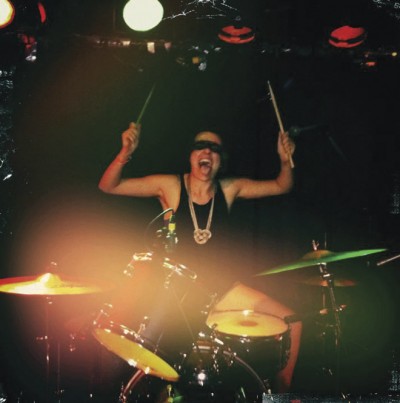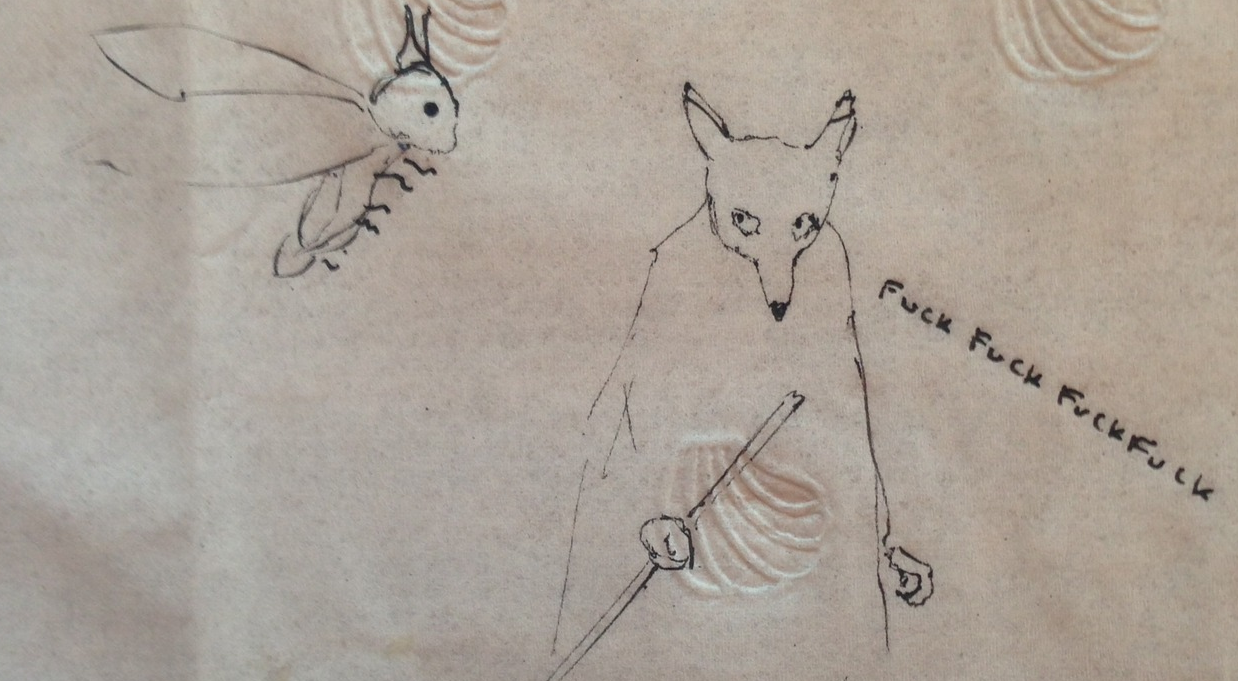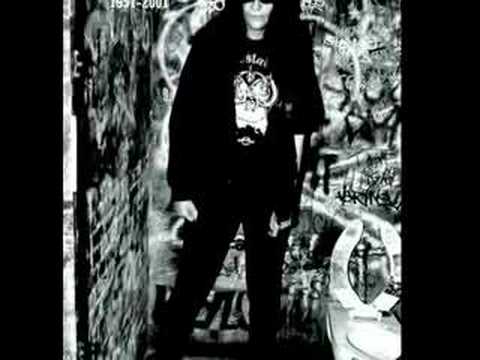Having a foot in both camps has its benefits. Rhonda Lowry, who is pursuing a BA in visual Critical Studies, plays drums for local Chicago act Bomb Banks and is deeply rooted in the vast community of musicians and artists in the city. Her field, however, has her turning a critical gaze towards everything and anything — her thesis had her writing about garbage, which is more interesting than it might sound. Additionally, she has her pulse on the beating heart of the international independent music scene as an intern at Pitchfork media, one of the most influential voices on the topic of contemporary music.
But Lowry seems fit for the tasks — all of them. She, for one, doesn’t shy from taking the first plunge into the murky, complicated depths of journalism. “I’ve been thinking about this notion of the interview since I’ve started having to deal with it directly [while working at Pitchfork],” she says. She hasn’t even taken her seat when she starts starts talking about “the problems inherent in the musician interview.”
It’s hard not to be surprised by this change in the order of things. one of the basic tenets in journalism, not to mention life, is “question first, answer next, repeat as necessary.” but not today apparently — Lowry seems bent on flipping the notion on its head…

Rhonda Lowry: There is a basic commodity exchange going on [during interviews], where the artist is coming forth for promotional reasons, and for the interviewer, there’s this sort of vampiric quality going on. It’s not a conversation, and I’m a big believer in conversation as an art form and conversation as something that’s really inspiring and motivating for me to create more. I get so many ideas from conversations I have with people. There was an interview I was transcribing at work the other day between a Pitchfork staff member and a certain musician, and it just killed me because the interviewer was asking the stupidest questions, and this artist was clearly uncomfortable and trying to resist the direction it was going in.
Brandon Goei: That’s the problematic part — when you can’t really have a conversation because you’re too busy wondering what they’re thinking.
RL: But not even just that — it’s also about asking the most reductive questions. It’s something that makes me wonder if I really want to pursue the field of music journalism.
BG: Why are you on the fence about it? It seems like you’re quite adept at it, and that you know what you’re talking about.
RL: I’ve also been thinking about what it means to write about art or about music — what are you actually covering, you know? I guess I’m not interested in the “commodity exchange” part of it. I’m interested in generating more ideas and in criticism being an art form in and of itself. I guess it’s because I have one foot in each camp — I’m a musician and I’m really tapped into this community of artists, which is where I get a lot of my strength and inspiration. But I’m also a very critically-minded person and very interested in the scope of things going on — how they fit in a broader context. I do feel a kind of division in myself.
BG: I think I understand what you mean. Do you identify with one side any more than the other?
RL: I feel like if you’re a music journalist and you’re not involved at least some way in the music-making process, what’s the point? How are you even going to participate in a conversation with someone when you don’t know what the process is like, or when you’re alienated from being an artist? That’s really what was so infuriating about that last musician interview I was working with — this person was just completely separate from the process and asking the most bullshit questions. He was holding the artist up to “societal standards,” the interviewer’s exact words, which don’t have a place in a real conversation with a real person — terms like that are just too stiff and didactic.
BG: Is there a model interviewer for you? Someone who does it right? Is it yet to happen?
RL: I’ll know it when I see it. I actually made an angry Facebook post about this issue, and it started a lengthy conversation where people posted different interviews they thought exemplified good interviewing. There was a link to a YouTube clip of an interview that Icelandic musician Björk conducted with Estonian composer Arvo Pärt, and it was this beautiful thing where she had a certain enthusiasm about it. It wasn’t like she was trying to suck something out of him — she was just excited about talking with him. I guess that brings up the question of objectivity and being impartial. With the interviews I’ve conducted, it’s because I’m compelled to talk to someone because of what they do — it’s not objective. So it comes back to the role of the critic or the interviewer, and whether it’s to be an über-fan or an intellectual peer or just an extractor of something. Either way, it’s not to be a tourist asking stupid questions.
BG: Could you talk a little about Bomb Banks, the band you’re in right now?
RL: The band was started a few years back as the side-project of Jon Ziemba, who was the drummer for the Chicago noise band Coughs. Once his main band had broken up, Bomb Banks became his focus. I think the first couple of shows he did were basically just him singing a capella and maybe banging on some things around the room, but that was it. Then it grew, and he started playing guitar and using tapes. He was already a good friend of mine, and I went to see him once in the basement of Dr. Who’s Warehouse of Ideas (a great venue that, sadly, closed). He was performing well, but you could tell it was kind of flat — because it was just him. So I went up to him after the show and I told him, “You need a drummer, and that drummer is me.” Eventually, we also added another guitarist, Brett Koontz, who adds a little more depth to the music too. And that’s us: John, Brett and Rhonda.
BG: What catches your ear these days? Who’s your favorite live act right now?
RL: Mostly Chicago folks. I really, really like Wume, who is the duo of Al Schatz and April Camlin. He plays synths and she plays drums, and she is the sickest drummer. She’s very melodic and tonal, and uses a ton of crazy time signatures. It’s very precise and direct — April is very purposeful and works with a great sense of building. Their music is kinda spacy (they wear the adjective “new-age-y” proudly on their sleeve), and it’s great to see them play because they just get me moving. In terms of visceral energytransfer — something that’s not necessarily about the actual music that’s happening, but more about the presence — I love Running, which is more in the Noise genre, with just enough ’70s punk throwback. I’m pretty sure the name of the band comes from the fact that they have this fucked up pedal that makes this squelchy noise you hear in all of their output. That noise is their calling card. It runs through their whole show and links all of their two-minute songs into one giant song. The drummer for that band is really great. They’re really simple beats, but he’s really jerky and erratic when he plays, which I love.
BG: Are there any older acts that you’re a big fan of, especially with the style of drumming you seem to be attracted to? When I think of that spastic style, I almost immediately think of Greg Saunier.
RL: I love that you brought him up! He’s totally a drummer that made me want to be a drummer. I was a huge fan of Deerhoof, and I really loved how playful and fun his drumming was, and really, how his drumming leads that band. When they were at the Bottom Lounge in 2009, I went to go see them and had a great time. I was completely euphoric after the show and thought to myself, “I should just go up and talk to him.” I mean, he seems so nice and he’s got this big smile, so I went up to him after the show and said to him, “You know, you’re a drummer that made me want to be a drummer.” And he said back to me, “Oh, you’re a drummer? Yeah, you’re definitely a drummer — I can tell. You’ve got that drummer’s twinkle.” That made me so happy, I could’ve died right there.







